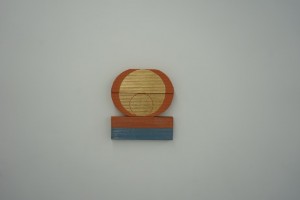






Oscar Abraham Pabón (1984, Venezuela) started talking to the plants in his studio about five years ago. It was around the time that he was interested in the work of the Austrian philosopher Ludwig Wittgenstein. No easy material. By reading his philosophical texts to his plants, he not only contributed to their well-being (it is assumed that plants grow faster due to the exhalation of CO2 in their presence and the vibrations of one’s voice), but his pace of reading naturally slowed down as well and made him understand the text better.
The new installations Nepenthes (2019) and Talking to the plants (2019) shown here stem from this custom. They consist of a variety of indoor plants accompanied by translucent speaking tubes, whose colors are reminiscent of the transparent color surfaces by the Venezuelan Op art artist Carlos Cruz-Diez. Within the oeuvre of Pabón, this is no coincidence. He is often inspired by geometrical abstract idioms, as is also evident in the wall sculptures in the exhibition. These series, Sincere color from the promised city (2019) and Eliade paintings (2019), are part of an existing group of works made with red bricks characteristic of the Venezuelan urban landscape. Obviously, the bricks allude to the idea of construction and, especially in the Venezuelan context, to (economical) progress. At the same time, they also display a certain fragility. The partially exposed and carved hollow bricks, some of which are accentuated with color hues, are the result of what can be called a material experimentation with clay and color; the artist plays with repetitions and patterns so that new compositions are constantly created.
Just like plants, bricks belong to our daily environment; they fit within the public, urban or intimate, domestic atmosphere. The use of everyday elements is a constant in Pabón’s oeuvre. Previously, he worked with (shower) curtains, carpets, tables and stools: objects whose shape is determined by both aesthetic and functional considerations. He also designed monumental constructions with social purposes for public space. It is the tension field between decoration and practical utility in which the artist, trained as an architect with a background in urban planning, is interested.
Recently, Pabón has increasingly replaced the complex philosophical texts with personal monologues about the current critical situation in Venezuela. Pabón’s plants became an ‘excuse’ for him to talk freely and to recall memories. This of course also has a therapeutic effect - the Greek name ‘Nepenthes’ means ‘no sorrow’. Never before has the socio-political context of Venezuela forced itself on Pabón in a way that an intimate habit gained a place in his work. But not only for him, also for the spectator, Talking to the plants is an ‘invitation to introspection’, Pabón says.
- Madelon van Schie